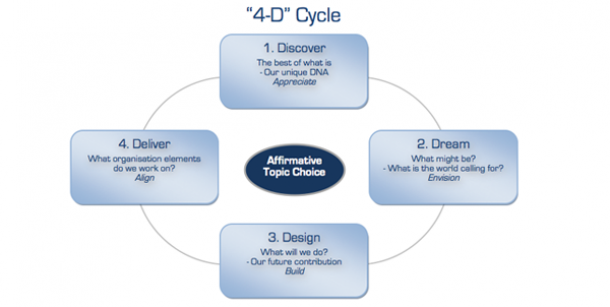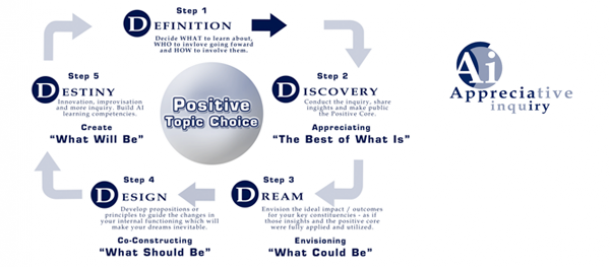In a Nutshell: Appreciative Inquiry
Appreciative Inquiry (AI) is a popular approach used by OD consultants that was pioneered by a US professor of organisational behaviour called David Cooperrider in the mid 1980s.
In many ways, the emergence of AI pre-dates the positive psychology movement and the strengths movement, which both came to prominence during the late 1990s- early 2000s.
Cooperrider, while studying organisational behaviour at Case Western Reserve University, had observed that traditional approaches to organisational change were notoriously unsuccessful (see John Kotter’s book “Leading Change” for an excellent treatise on this). The standard approach was rooted in problem solving analysis that started from a position of fault-finding in looking at what was deficient, defective, broken, not working or needing to be fixed, rather than looking for the “life giving properties” of human systems and working to build on strengths.
A new positive approach to change became the foundation for Cooperrider’s doctoral dissertation in 1986 called "Appreciative Inquiry: Toward a Methodology for Understanding and Enhancing Organisational Innovation." Cooperrider’s ideas were initially met with resistance when presented to the OD community in the mid 80s, however, a small group of practitioners embraced the basic theory and the popularity of AI has steadily been on the increase since.
In 1987, Cooperrider and Suresh Srivastva published "Appreciative Inquiry in Organisational Life." For many, the article is considered the seminal work on AI calling for a shift in the field from its deficit-based theory of change to a positive, life-centric theory.

Cooperrider was encouraged to write a textbook for the field of AI, but instead encouraged others to propose models and further the development of the conceptual framework. As a result, many interpretations of AI have proliferated and it is inaccurate to say that there is any one official version. “The Thin Book of Appreciative Inquiry” (1996) by Sue Hammond is probably the most well known book on the subject. In the late 1990s, a “4-D" model of Appreciative Inquiry appeared and has come to be strongly associated with AI, which is described below.
Overview:
Appreciative Inquiry (AI) can most accurately be defined as a philosophy or a way of thinking, and as such a range of definitions of AI are presented here to help explain the concept more fully:
- “AI is a philosophy that incorporates an approach, a process (4-D Cycle of Discovery, Dream, Design, and Destiny) for engaging people at any or all levels to produce effective, positive change. It is based on the following assumption: Every organisation has something that works right – things that give it life when it is most alive, effective, successful, and connected in healthy ways to its stakeholders and communities. AI begins by identifying what is positive and connecting to it in ways that heighten energy and vision for change.” — Cooperrider, Whitney and Stavros
- “Appreciative Inquiry is the cooperative search for the best in people, their organisations, and the world around them. It involves systematic discovery of what gives a system ‘life’ when it is most effective and capable in economic, ecological, and human terms. AI involves the art and practice of asking questions that strengthen a system’s capacity to heighten positive potential. It mobilises inquiry through crafting an “unconditional positive question’ often involving hundreds or sometimes thousands of people.” — Cooperrider and Whitney
- “Appreciative Inquiry is a form of organisational study that selectively seeks to highlight what are referred to as “life-giving forces” (LGF’s) of the organisation’s existence. These are the unique structure and processes of an organisation that makes its very existence possible. LGF’s may be ideas, beliefs, or values around which the organising activity takes place.” — Srivastva
- “Appreciative Inquiry focuses us on the positive aspects of our lives and leverages them to correct the negative. It’s the opposite of ‘problem-solving.' ” — White
- "Appreciative Inquiry (AI) is the name given to a strengths-based methodology or positive approach to change and improvement." — AppreciativeInquiry.net.au
- "Appreciative Inquiry is a collaborative, strength-based approach to both personal and organisational development that is proving to be highly effective in thousands of organisations and communities in hundreds of countries around the world." — The Center for Appreciative Inquiry
- "Appreciative Inquiry (AI) is a way of being and seeing. It is both a worldview and a process for facilitating positive change in human systems, e.g., organisations, groups, and communities. Its assumption is simple: Every human system has something that works right–things that give it life when it is vital, effective, and successful. AI begins by identifying this positive core and connecting to it in ways that heighten energy, sharpen vision, and inspire action for change." — The Center for Appreciative Inquiry
- "AI starts from the positive perspective. Rather than looking at what is wrong, it looks at what is right in the organisation. It is the discovery of the best in people, their organisations, and the world around them." — Edwin C. Thomas

Models of AI: The 4-D Cycle is one of the most common approaches for implementing Appreciative Inquiry:
- Discover: The identification of organisational processes that work well.
- Dream: The envisioning of processes that would work well in the future.
- Design: Planning and prioritising processes that would work well.
- Destiny (Deliver or Deploy): The implementation of the proposed design.
The model is based on the assumption that the questions we ask will tend to focus our attention in a particular direction and in turn lead to the results we get. The aim of AI is to focus the inquiry around what works, rather than inquiring into what doesn't, since it will tend to produce more of the same.
Some have suggested that a 5th step be added called “Define” and use a 5–D model instead. Cooperrider’s dissertation called this step the “affirmative topic,” which sits in the middle of the cycle, and many models retain this label.

(Above: an example of an adapted 5-D AI model that was developed for work with one of our clients)
The 4-D Cycle of inquiry relies on qualitative interviews to understand the organisation's assets, strengths and potential. For example, if there is a problem with staff turnover, instead of focusing on why people are leaving through exit surveys, an AI approach would focus on why people stay. The line of questioning would start with: “What makes you excited to come to work?” When the line of questioning is too focused on problems and faults, people can get defensive and start to play the blame game. When looking at what works well, people want to be involved and are generally more engaged and enthusiastic about the process.
A real life case study of AI can be found with British Airways (BA), which had identified a problem with lost baggage. Instead of focusing on blaming employees and implementing more processes and punishments, they focused on creating an “Exceptional customer arrival experience.” Employees were asked to “describe times when customers had an exceptional arrival experience.” Through this “appreciative” interviewing process, a number of components of a great experience were identified and this became part of their quest for world-class service.
Sources:
- Appreciative Inquiry Into Organisational Life, Cooperrider and Srivastva, 1987
- Appreciative Inquiry Handbook (2005), Cooperrider, Whitney, and Stavros
- The Thin Book of Appreciative Inquiry (1996), Sue A. Hammond
- Foundations of Appreciative Inquiry: History, Criticism and Potential, Gervase Bushe, AI Practitioner, 2012
- The Appreciative Inquiry Model, Encyclopedia of Management Theory, Gervase R. Bushe, 2013
- Appreciative Inquiry: A Positive Approach to Change, Edwin C. Thomas
- Appreciative Inquiry Commons (Appreciativeinquiry.case.edu)
- The Center for Appreciative Inquiry (Centerforappreciativeinquiry.net)
This article offers an expanded description of the summary listed in our post 40 Must-Know HR, OD, L&D Models.

Theo Winter
Client Services Manager, Writer & Researcher. Theo is one of the youngest professionals in the world to earn an accreditation in TTI Success Insight's suite of psychometric assessments. For more than a decade, he worked with hundreds of HR, L&D and OD professionals and consultants to improve engagement, performance and emotional intelligence of leaders and their teams. He authored the book "40 Must-Know Business Models for People Leaders."

.png?width=374&name=Nutshell%20-%20Hierarchy%20of%20Needs%20(Maslow).png)

We Would Like to Hear From You (0 Comments)